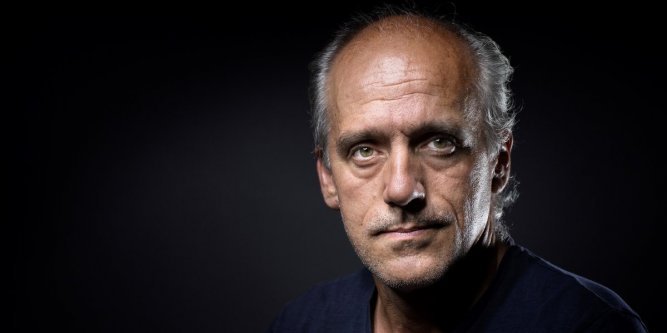Photo: AFP/Joel Saget
Left Voice’s second issue, “Women on the Front Lines”, is now available for purchase. For every magazine sold, we will donate a dollar to a worker controlled factory in Argentina.
The unusual nature of the 2017 French presidential election is the culmination of a larger organic crisis currently facing French capitalism. The two major social and political alliances that have dominated French politics since the 1980s – that is to say the “left” (or more precisely, the center-left) and the “right” – have been slowly, but surely, coming apart. Uncertainty about the election’s outcome has continued to grow: less than two weeks before the first round on April 23, there is no clear front-runner. Four candidates – Emmanuel Macron (En Marche!, center), Marine Le Pen (National Front, far-right), Jean-Luc Mélenchon (Unsubmissive France, far-left), and François Fillon (The Republicans, center-right) – could make it to the second round of voting on May 3. Jean-Luc Mélenchon is without a doubt the great surprise, now polling higher than François Fillon. The latter has suffered repeated scandals related to corruption and nepotism.
Behind the frenzy of the presidential campaign hides the ruling class’s inability to form a new historical bloc. Three political projects are competing to fill the vacuum left by the collapse of the traditional two-party system. On one hand, Emmanuel Macron, François Hollande’s former Finance Minister, is trying to renew and modernize the bourgeois political hegemony. His goals are coherent: he defends the European Union and has promised to push the neoliberal agenda even further. But his social base is mostly limited to the upper-middle and upper classes and his project clashes with the country’s traditional left/right political structure. There is no doubt that he is Hollande’s worthy heir, as he was the first to not include a major component of the “left bloc” – the French Communist Party – in his government while trying to reform the country’s labor laws, a cornerstone of France’s post-WW2 social compromise, effectively killing off the dying “left bloc” once and for all.
On the other hand, the right-wing sovereigntist Marine Le Pen has continued to garner support. Unlike Macron, Le Pen’s political program lacks social homogeneity and political coherence. Her electoral base is mostly made up of a mix of workers and small business owners whose interests are often contradictory, particularly with regards to the state and public services or to corporate taxes and business profits. These contradictions run deep, and if the National Front was to come to power, they would certainly erupt into broad daylight.
The implosion of the traditional “left” has created a space not only for Macron and his “progressive” bourgeois bloc, but also for Jean-Luc Mélenchon and his slate, Unsubmissive France. In his 2012 bid for president, Mélenchon acted mostly as a counterpressure to the Socialist Party’s sustained right-wing shift, while capitalizing on the most radical wing of “anti-Sarkozyism.” This time Mélenchon–maybe inspired by his mentor, the former socialist president François Mitterrand–is seeking to revive his own brand of populist left-wing sovereigntism. “The Internationale” and the red flag have thus given way to “La Marseillaise” and the French Tricolor flag.
In an attempt to escape the unfortunate fate of George Marchais, Mélenchon has conveniently forgotten capitalist society’s antagonistic class structure, opting for the easier schema of “the people” against “the elites”. His citizen revolution is a poly-classist alliance in which the working class loses its hegemonic potential, its methods of struggle, and its class independence, and contents itself with a mere change in constitutional regime within the framework of the capitalist system. Concerning the European Union, Mélenchon has been talking about a mysterious “Plan B” ever since Alexis Tspiras’ utterly failed to challenge austerity in Greece, betting everything on a more than dubious modification of European treaties and a shift in the EU’s austerity politics. This would allegedly be possible thanks to France’s weight as the second biggest economy in Europe.
However, beyond the obvious limits of his political program and the difficulties he would face to transform his electoral progress into organizational progress, the fact that a mass space has opened up to the “left of the left” demonstrates the very real political and social polarization underway in the French political spectrum: those myopic pundits who only saw the lower classes’ shift to the right have been suddenly surprised by this new trend. Financial markets, now used to evaluating the risk of a Le Pen presidency, have begun considering the risk of a Mélenchon presidency.
In this context, anti-capitalists have been able to make their voices heard, sometimes even loudly. This is especially true for Philippe Poutou, the New Anti-capitalist Party candidate whose participation and rhetoric in the one and only presidential debate with all eleven candidates sparked reaction internationally with articles published in The Guardian, The Financial Times and even The New York Times. This confirms not only the radicalized and volatile political climate that we described above, but most of all, the subversive nature of Poutou’s campaign within the French political landscape.
The characteristics of the political crisis in France
As Bruno Amable and Stefano Palombarini have correctly observed in their new book, The Illusions of the Bourgeois Bloc, for decades now, the lower classes have found themselves without political representation in France: “The specific characteristic of the political crisis in France is the more or less complete exclusion of the lower classes from the social alliances upon which both right-wing and left-wing governments have tried to build their action in the past few decades.” The right-wing’s current problems are the direct result of the end of the post-war boom and the sharp fall in economic growth. The economic downturn has caused a division between small business owners and artisans on the one hand, and workers on the other – two sectors that used to support this political formation hegemonized by the upper classes of French capitalism. While the former tend to press for increased liberalization of the labor market and a reduction in what they consider to be a financial burden imposed by the “Welfare State,” the latter seek greater protection against the consequences of prolonged economic crisis.
However, the lower classes’ disenchantment with the “left,” beginning with their deception under the Mitterrand administration and continued until today under President Hollande, is of a whole different nature. There is a deliberate attempt being made on behalf of neoliberal European capital, some of whose main allies are at the head of the Socialist Party – whether it be Jacques Delors, Mitterand’s Finance Minister and one of the architects of Europe’s turn towards austerity, or Mitterrand himself, who was at the origin of the Treaty of Maastricht that paved the way for the euro – to liquidate this traditional “left” by excluding the French Communist Party. At the same time, they are pushing to orient it towards the center, seeking to discredit the working class as a subject capable of being won over by such a program.
As a result, the working class is presented as a conservative and culturally backwards political subject, forever lost to the National Front, and an obstacle to any attempt of “modernization.” This is the foundation for the rhetoric that divides workers into “outsiders” and “insiders,” into relics of the past clinging to their status and benefits, and ultimately would explain a “conservatism” that has prevented the creative destruction of capital, the only way forward for the French capitalist class if it is to become once again rival on an equal footing with Germany.
As a report by the Socialist Party-affiliated Terra Nova foundation explains: “The identity of the historical left coalition had a class-based logic: the ‘exploited’ workers against the bosses and representatives of capital; the precarious and lower-paid workers against middle- and upper-management and the upper middle class […]. The reconfiguration currently underway is happening outside of these traditional coordinates. It is a struggle to define the future. The new left has the face of the France of tomorrow: younger, more female, more diverse, more qualified, more urban. The France of tomorrow, waiting to be born, is united by cultural values: change, tolerance, openness, solidarity, optimism. The France of tomorrow is opposed to an electorate that defends the present and the past against change.” For these supporters of the renewed bourgeois bloc, the left must abandon its class-based logic and reconfigure itself on the basis of cultural values.
Within this framework, the attempt to present the National Front as the “new party of the working class” not only unreasonably exaggerates the real weight of Marine Le Pen, but also fosters the construction of this new bourgeois bloc against the interests of the lower classes and completely naturalizes the scission between the working class and the left. The truth is that if we take into account the level of abstention and the disenfranchised–immigrants for example–the National Front only obtains 1 out of 7 working-class votes, far from the organic influence exercised by the French Communist Party during its golden age.
What is certain at this point is that “the National Front (…) represents, at least statistically, the best bet – or to be precise, ‘the lesser evil’ – for the lower classes. That is to say, it is the party that underrepresents them the least.” [1]
Poutou against the current
Philippe Poutou’s declarations were a hit, demonstrating the hegemonic potential of a working-class program. This program is independent of the corrupt professional political caste represented by François Fillon, who stole millions of euros while asking the population to tighten its belt more and more, and by Marine Le Pen, who has been using her immunity as a European MP to escape criminal prosecution while claiming to fight against this same system.
The appearance of anti-capitalist auto factory worker Philippe Poutou in last week’s presidential debate showcases the possibilities for the working class to have a hegemonic program and discourse that speaks to millions of exploited and oppressed people across the country, despite the corporate media’s attempts to stifle it. The enormous wave of sympathy expressed in workplaces, at university campuses, and on social media, was met with the deep-rooted class hatred unleashed by supposed philosophers and journalists, the watchdogs of capital. This also proves that the working class is not inescapably destined to either be excluded from the political process or be the hopeless social base for the National Front’s xenophobic sovereignist aims. On the contrary, the working class has the potential to once again become the “dangerous class” that the bourgeoisie so fears, on the condition that it overcomes its internal divisions and advances a hegemonic program that addresses the aspirations of its most exploited members – the precarious, the unemployed, the youth of the banlieue. The French labor movement has shown this potential in its heroic struggles and revolutions of the past.
Philippe Poutou’s campaign shows us that it is possible to break the death spiral of identity and culturally-based politics (neoliberals/modernists vs. conservatives/traditionalists) if we advance a working class-based logic. This flies in the face of the citizen-based logic of a “French Podemos,” yearned for by a part of the NPA’s first minority (former Revolutionary Communist League’s [LCR] leadership). Under this treacherous schema, workers can only tag along with either of two reactionary bourgeois projects: European neoliberalism or chauvinist nationalism. For this reason alone, Philippe Poutou’s campaign has already given hope to hundreds of thousands of workers in France today.
Notes
[1] “‘L’électorat’ du Front National. Retour sur deux ou trois ‘idées reçues ‘», Patrick Lehingue en « les Classes populaires et le FN », Editions du Croquant 2017 pág. 38











